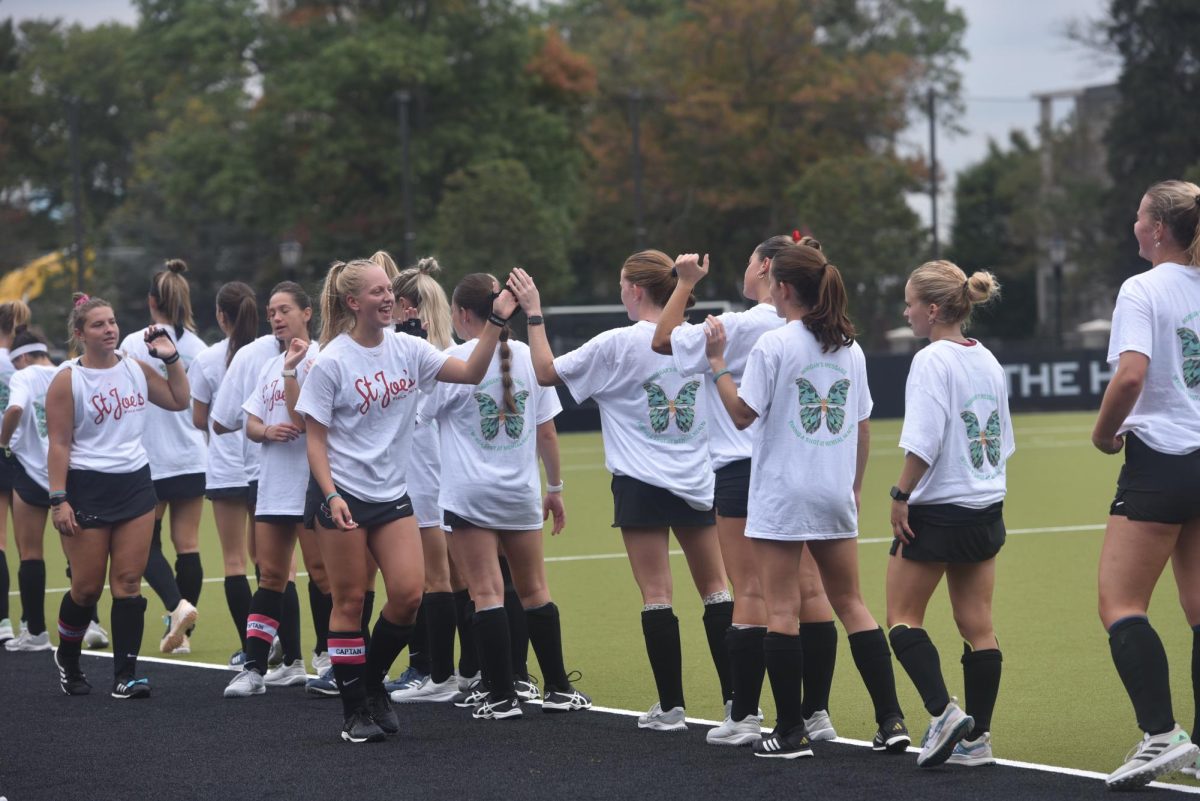Simone Biles. Michael Phelps. Kevin Love. Naomi Osaka.
These are some of the professional athletes who have openly talked about their struggles with mental health. However, other athletes, whose names are often forgotten, do not have this same chance or platform, and some are only found to be struggling with mental health when it is too late.
In conjunction with Morgan’s Message, a non-profit organization that strives to create greater conversation around mental health within the athletic community, the St. Joe’s women’s field hockey team is utilizing their platform to continue this work on our own campus.
“I think, as athletes, you have a platform at your school,” said Maggie Dickman, an assistant coach for the St. Joe’s field hockey team. “You can use that for good. I think that’s what our players are trying to do with Morgan’s Message.”
Morgan’s Message was founded in 2020 after Morgan Rodgers, a collegiate lacrosse player at Duke University, lost her battle against her mental health and died by suicide in 2019 at the age of 22. The organization was founded by Rodgers’ closest friends and family so that student-athletes and others would not have to experience the same pain Rodgers did.
The organization aims to “amplify stories, resources and expertise to strengthen student-athlete mental health, build a community by and for athletes through peer-to-peer conversations and provide a platform for advocacy,” according to its website.
“I think it makes the greater public aware that athletes are more than just athletes,” said Caroline Brickley, a junior midfielder on the field hockey team and organizer of the Morgan’s Message game. “We’re people, we’re students, we go to class, we all have friends outside of the team. So understanding that we’re more than just the people on the field and the people between the lines.”
Around 5% to 35% of all elite athletes struggle with a form of mental health disorder, according to the International Olympic Committee’s 2019 consensus statement. Of college athletes, around 10% to 25% are reported to have depression or eating disorders.
“A student-athlete carries multiple responsibilities that can make it more difficult to maintain a sense of health and well-being,” wrote Scott Sokoloski, Ph.D., director of St. Joe’s Counseling and Psychological Services (CAPS), in response to written questions from The Hawk.
Student-athletes face the pressures of performing both academically and athletically, in addition to societal stigma that exist surrounding mental health, Sokoloski wrote.
“There can also be a stigma involved that acknowledging mental health concerns is a sign of weakness, and one that they do not have time to deal with because their coaches and teammates (and sometimes what feels like the entire university) are counting on them,” Sokoloski wrote.
At St. Joe’s, the men’s and women’s lacrosse teams, the women’s soccer team and the field hockey team have all dedicated games to Morgan’s Message, as have many schools across the country, including Drexel University, Temple University and Bryn Mawr College.
“I think Morgan’s Message provides a connection between different schools that do the Morgan’s Message game,” Dickman said. “It provides an outlet outside of St Joe’s.”
This connection across campuses allows for greater conversations, Dickman said. It also fosters relationships of trust between teammates and athletes at various colleges, which is pertinent for learning about and destigmatizing mental illness.
“Educating ourselves does not only come from taking a class or reading an article,” Sokoloski wrote. “It is most powerful when it comes from someone we trust, who may be similar to us in some way, and their open conversation about their experiences. Peer to peer support is crucial in helping others overcome stigma.”
For the field hockey team, the Morgan’s Message game served as a reminder to check on their own mental health.
“We have a really long season that’s really demanding and takes a lot out of us,” Brickley said. “It’s really important for us to check back in with our mental health and know that we’re there for each other, and also that it’s not something that we should be afraid to talk about with each other.”
Mental well-being is a pillar of the field hockey team’s camaraderie, instilled by their coaches, Dickman said.
“We do a lot of check-in meetings with our team and our players,” Dickman said. “Every two weeks or so, we’ll have check-in meetings with them, just one-on-one with the coach to make sure that they’re doing well in school and hockey, and just in life.”
With the dedication of their game to Morgan’s Message, the field hockey team looks to do what athletes do best: push those around them to get better, not only in athletics but in life, Brickley said.
“A lot of athletes and people who’ve been around sports just have that kind of internal feeling of motivation to just help people get better and help the people around them feel comfortable and support them,” Brickley said.
Members of the St. Joe’s community seeking support are encouraged to contact the following resources:
Counseling and Psychological Services (CAPS), 610-660-1090
Campus Ministry, 610-660-1030
The Office of Student Outreach & Support, 610-660-1149
The Jesuit community, 610-660-1400
Employee Assistance Program, 866-799-2728

















































